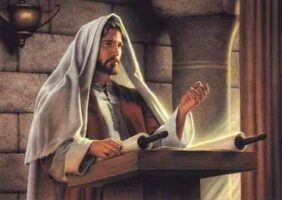Vayikra from a Messianic Perspective

Leviticus 1:1-5:26(6:7)
Torah portion Vayikra begins with a focus on the sacrificial system at the heart of Levitical worship. It’s all about knowing the different offerings—burnt, grain, peace, sin, and guilt offerings. Each has its own purpose and place in worship and community.
Burnt offerings were totally consumed by fire, showing complete dedication to God. Imagine giving something up fully, without holding back, which speaks to a level of commitment and devotion that’s pretty deep. On the flip side, grain offerings come without bloodshed, wrapping up sacrifice in gratitude and recognition of God’s provision.
Peace offerings were unique as they were shared. A part was burnt, part was eaten by priests, and the offerer got a portion back. There’s a sense of community and thanksgiving, a reminder that worship isn’t in isolation. Plus, with sin and guilt offerings, there’s an approach to covering specific transgressions—restoring something lost, reconciling what was broken.
Holiness threads through these practices, pushing for a community that lives set apart, aligned with God’s expectations. Holiness isn’t just about rituals but about heart changes and commitments towards living differently, with integrity and sincerity. Vayikra’s emphasis on sacrifice and holiness guides how followers can foster a closer connection with God and with each other.
Messianic Insights: Finding Messiah Yeshua in Torah Portion Vayikra
Unveiling the connections between Vayikra’s sacrificial system and Yeshua’s atonement, we find profound meaning in Jesus’ ultimate sacrifice. The burnt offerings remind us of his complete self-giving. Like those offerings consumed fully by fire, Jesus’ sacrifice illustrates a commitment that was total and transformative. Through His death, He brought a deeper spiritual purification, one that the old sacrificial system pointed toward but couldn’t fully accomplish.
In Vayikra, the role of the priest is central in mediating between God and His people. Jesus embodies the ultimate High Priest, bridging the divine and human. His teachings and actions reflect an intimate understanding of our struggles and a deep intercession for humanity, qualities rooted in his splendid compassion and empathy. The priest’s duties in Vayikra lay a groundwork for understanding Jesus’ intercessory work from a new covenant perspective.
Now every cohen stands every day doing his service, offering over and over the same sacrifices, which can never take away sins. But this one, after he had offered for all time a single sacrifice for sins, sat down at the right hand of God, from then on to wait until his enemies be made a footstool for his feet. For by a single offering he has brought to the goal for all time those who are being set apart for God and made holy.
(Hebrews 10:11-14 CJB)
Forgiveness, an essential theme in both Vayikra and Jesus’ teachings, shows a continuity that’s hard to ignore. Jesus often emphasized forgiveness, urging his followers to forgive as freely as they’ve been forgiven. His parables, like the Prodigal Son, echo the restoration and reconciliation that sin and guilt offerings symbolized in Vayikra. Through these insights, believers can appreciate a consistent divine narrative that spans both Testaments.
Living the Message: Life Applications for Followers of Yeshua
The principles in Vayikra ask us to consider what it means to live with intentional sacrifice. Following Yeshua involves embracing a lifestyle that reflects self-giving and dedication. Not just in grand gestures but in everyday acts of kindness and love. It’s about creating space for others, offering time, energy, and resources without seeking acclaim.
Pursuing holiness goes beyond ritual; it’s an invitation to shape one’s life around Yeshua’s example of righteousness. Holiness begins in the heart, influencing actions and attitudes. Cultivating spiritual disciplines such as prayer, study, and thoughtful engagement with community draws us closer to God’s vision for a holy life.
Community matters, and it’s somewhere Vayikra shines. The Torah portion reminds us that reconciliation and relationship are foundational. Jesus’ teachings amplify this through His insistence on forgiveness and unity. As His followers, we ought to actively build bridges, mend ruptures, and always opt for connection over conflict.
These lessons beckon us to align more closely with the message of Vayikra and the life of Yeshua. By living sacrificially, pursuing holiness, and fostering community, we reflect the love and grace at the heart of our faith.
Dale Solberg is a guest writer at Messianic Torah Portion offering a commentary and devotional thoughts from a Messianic Perspective on each week’s Torah reading. His views and opinions do not necessarily reflect those of The Messianic Light. You can reach Dale at dale@messianictorahportion.com.
Unless otherwise noted, Scripture quotations are taken from the Complete Jewish Bible, Copyright © 1998 and 2016 by David H. Stern. Used by permission. All copyrights reserved worldwide.
This post contains affiliate links. Purchases help support Messianic Torah Portion and do not affect the price you pay. Please do not make purchases on the Sabbath.
Messianic Torah Portion is a ministry of The Messianic Light.

Comments
Vayikra from a Messianic Perspective — No Comments
HTML tags allowed in your comment: <a href="" title=""> <abbr title=""> <acronym title=""> <b> <blockquote cite=""> <cite> <code> <del datetime=""> <em> <i> <q cite=""> <s> <strike> <strong>